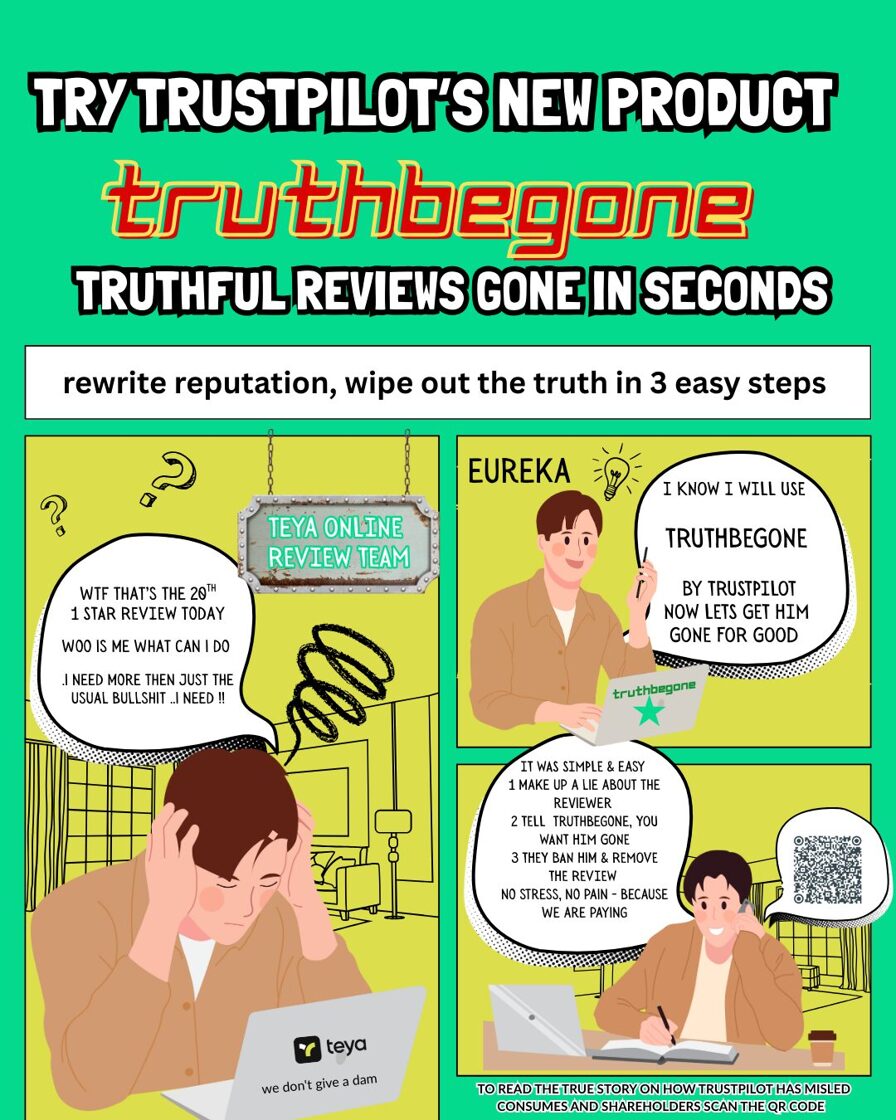What Have We Got When We Don’t Have Trust ? A Shareholder’s Reflection on Trust, Reputation, and the Cost of Concealment
What Have We Got When We Don’t Have? A Shareholder’s Reflection on Trust, Reputation, and the Cost of Concealment
What have we got when we don’t have transparency? When we don’t have accountability? When we don’t have answers to questions that matter—not just to shareholders, but to the integrity of a platform built on trust?
As a shareholder in Trustpilot Group plc, I’ve spent months trying to understand how a company that claims to democratize reputation can simultaneously enable its paying clients to suppress it. What I found was a system that rewards silence, punishes scrutiny, and manufactures trust on demand.
The Business of Reputation Laundering
Let’s be honest: some companies don’t want feedback—they want control. They don’t want to listen to their customers—they want to silence them. And they’re willing to pay for it.
Trustpilot’s paying clients have access to advanced moderation tools, including the ability to flag reviews. But when those tools are used almost exclusively to target 1-star reviews—like in the case of Teya, Dojo, Mollie, Worldpay, and Revolut—it’s not moderation. It’s manipulation.
Teya, for example, flagged 100% of its 1-star reviews, with an invalid flagging rate of 35%. That’s not quality control. That’s reputation laundering. And Trustpilot helped them do it—through a private Slack channel, where responses were co-authored, reviews were dissected, and narratives were shaped.
The Cost of Silence
Teya didn’t just suppress reviews. It withheld customer funds, closed accounts without warning, and then used Trustpilot to publish templated responses that made the reviewer look like the problem. Here’s one example:
“We can confirm that the closure of your account was carried out in accordance with our internal risk framework and the regulatory obligations we adhere to. These decisions are never taken lightly and are made to protect the integrity and security of our services.”
Sounds official. Sounds reasonable. Until you learn that the exact wording was discussed on Slack, with Trustpilot’s input. Until you realize that the reviewer never breached any guidelines, but was timed out by Trustpilot’s own internal delays. Until you see that 11% of Teya’s reviews were 1-star, and most of them were removed—not because they were fake, but because they were inconvenient.
In my case, it was worse. They discussed my account on Slack. They used my own words to craft a response that made me look like the problem. And when I submitted a lawful DSAR to Trustpilot, I received redacted fragments—while Teya’s DSAR revealed unredacted coordination behind the scenes.
So I ask: what’s behind the redactions? What’s being concealed? And why?
A Platform Built on Trust—Or the Illusion of It?
Trustpilot trades on trust. But when its moderation system is used to protect paying clients at the expense of genuine reviewers, that trust becomes transactional. And when shareholders raise concerns—only to be met with silence—it’s not just a governance failure. It’s a betrayal of the very values the platform claims to uphold.
This isn’t about damages. It’s about dignity. It’s about the right to know, the right to challenge, and the right to expect better from a company that claims to democratize reputation.
If we don’t have that—what have we got?
Due to the sensitive nature of the evidence bundle, access is restricted. Journalists, regulators, and stakeholders may request access by emailing truth@astesgoododesgood,com A password will be provided upon verification.”
full_teya_file_and_gw_dsar_-compressed.pdf

#Trustpilot #Governance #ShareholderRights #Transparency #ReputationManagement #Whistleblowing #EthicalBusiness #Teya #ConsumerProtection #DataRights #GDPR #PlatformAccountability
